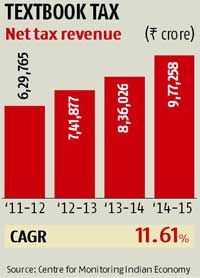If GDP growth is to be measured at market prices, indirect tax revenues will play a crucial role, never mind what the government eventually does with them, notes T C A Srinivasa-Raghavan
 If you delve into P V Kane's four-volume set of the Dharmashastras you will discover, among other things, the fundamental theorem of Hinduism: that reality and non-reality are easily interchangeable. All you need is a good purohit.
If you delve into P V Kane's four-volume set of the Dharmashastras you will discover, among other things, the fundamental theorem of Hinduism: that reality and non-reality are easily interchangeable. All you need is a good purohit.
The truth, the Dharmashastras tell us, depends on how you choose to view it. The Brahmins of yore, I might add, thrived on this principle.
Reality for them depended on how much land, how many cows, how many mounds of rice, how many jars of milk and ghee and how many seers of fruits the yejman could "sacrifice". The Brahmins, bless their greedy souls, did the rest.
It was, in a sense, a series of non-sovereign taxes imposed by God. Not even the sovereign was spared.
I am reminded of that now because the Central Statistical Organisation has informed us that the rate of growth of output in the Indian economy was a great deal higher during the last two years of the United Progressive Alliance-II than previously calculated by it.
However, said the CSO through the other side of the mouth - and without batting an eyelid - the actual level of output remained more or less the same.
In other words, the vehicle accelerated quickly and stayed in the same place.
Truth versus taxes
A couple of days after the new numbers were announced on January 30, I sat through a long discussion on them. No one could understand how this reversal had happened.
Budget 2015: Complete Coverage
Later, a long forgotten page from a college textbook on national accounting floated to the top of my memory. "GDP (gross domestic product) at factor cost," the lecturer had intoned, "is exclusive of taxes; GDP at market prices is inclusive of it."
Reality, as the ancient Hindus realised, depended on how much you paid the authorities.
The next day, I decided to pose a question to some of my economist friends. The question was this: "Suppose the government imposes a tax of Rs 100 for entering restaurants. But, for whatever reason, after paying the tax you are served nothing by the restaurant. Has GDP gone up, down, or remained the same?"
There was an exchange of mails. The upshot was that the economists didn't know. In the end, it degenerated into facetiousness.
But the fact remains, folks, even without an increase in output, when GDP is calculated at market prices, the entry tax has increased it by Rs 100.
 Repeated time after time, this would be reflected in the rate of growth even as no (or not much) additions to actual output took place.
Repeated time after time, this would be reflected in the rate of growth even as no (or not much) additions to actual output took place.
The real question, therefore, is whether the income of the government should be included in GDP or not.
If it is, then, theoretically at least, we can have high growth with no increases in output.
This, in fact, is what may have happened when Messrs Pranab Mukherjee and P Chidambaram started reversing the stimulus of 2008-11 by increasing indirect taxes. Government income went up and with it the rate of growth of GDP. But output didn't.
When I pointed this out to the economists, one of them said that GDP in constant prices had also gone up, so the mystery remained. Well, of course, it did: in order to keep the fiscal deficit down, Chidambaram didn't actually pay out all the subsidies that he had promised.
You see, at factor cost, taxes are excluded and subsidies are added. If you announce the subsidy but don't pay them, they show up on the wrong side and increase GDP at factor cost.
In fairness, I must admit I am oversimplifying.
Maybe, as the head of the National Statistical Commission, Pronab Sen, pointed out, there was an increase in efficiency so that gross value added -- which is what GDP measures -- increased even when actual output didn't.
Maybe the increased coverage also contributed.
Maybe the new methods of measuring GDP helped us get a more accurate picture.
But the basic question remains: if GDP growth is to be measured at market prices, indirect tax revenues will play a crucial role, never mind what the government eventually does with them.
I think we should have stuck to measuring it at factor cost.



.jpg)






